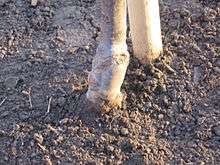Burrknot
Burrknot is a tree disorder, which is caused by formation of adventitious root primordia. Although previously classified as disease, is now classified as a disorder, as it is no longer believed to be pathogenic.[1]

First looks like a smooth orange bulge growing from the stem or a branch, later multiple adventitious roots form.
Description of the Disorder
The occurrence of Burrknot is quite common among rootstock, often found on apple tree M ( Malling ) and MM ( Malling-Merton ) rootstocks.[2] At onset it begins to look like a smooth orange bulge growing from the stem or a branch, later, during one to three years, multiple adventitious roots begin to form.[1]
When located on the roots, it is considered to be not very dangerous, but it makes it easier for diseases to infect the tree, and leaves it more susceptible to insects.[3] When many burrknots are present on various location in the tree, it can make the tree unproductive.[4]
Treatment
It is recommended to protect trees from moisture and shadow at the burrknot location, and to prevent infestation by synanthedon myopaeformis.[1]
Similar diseases and disorders
A disease somewhat similar in appearance is a crown gall.
References
- 1 2 3 Kůdela, Václav. "Bradavčitá uzlovitost na kmenech jabloně". online article. ZahradaWeb.cz. Retrieved 2011-11-19.
- ↑ cummins, steve. "THE CORNELL-GENEVA ROOTSTOCKS". online article. cummins nursery.
- ↑ Pfeiffer, killian; biddinger, hull. "Burr Knot Borers". Online Reprint. NRAES. Retrieved 2011-11-19.
- ↑ Roos, Debbie. "Apple Problem". online database. chatam county center. Retrieved 2011-11-19.